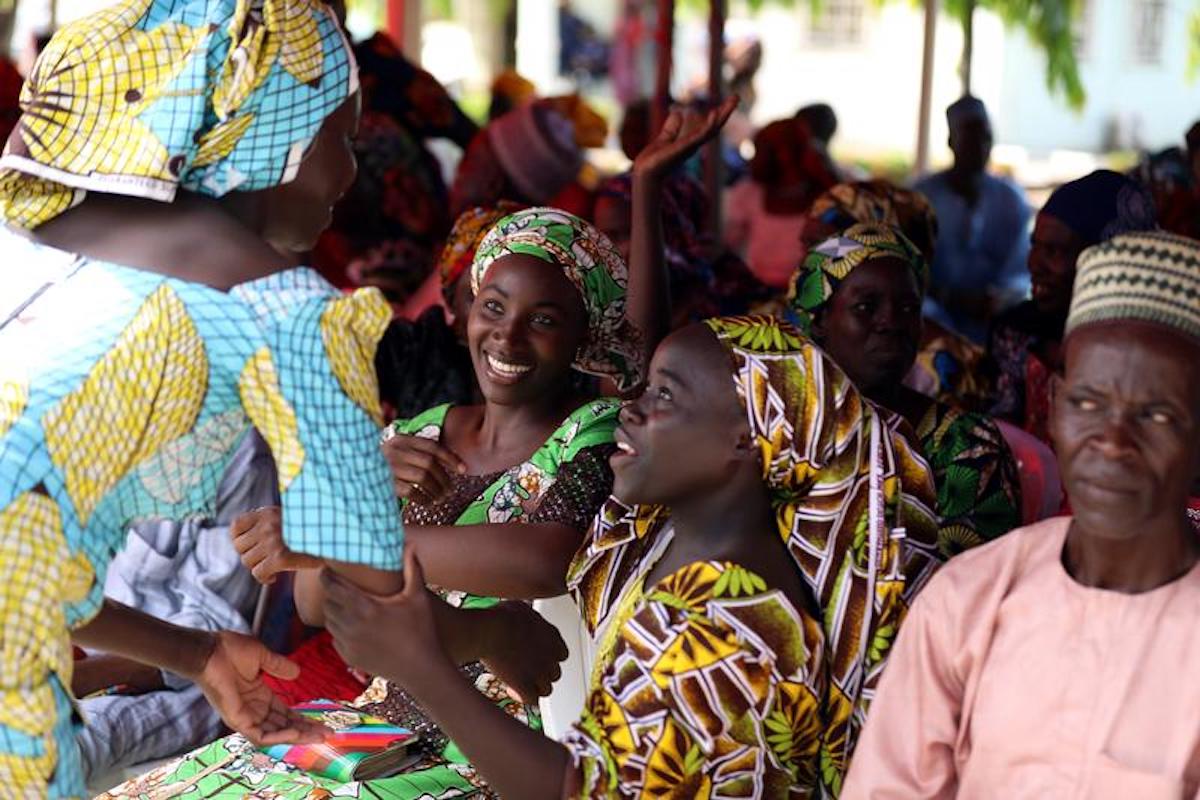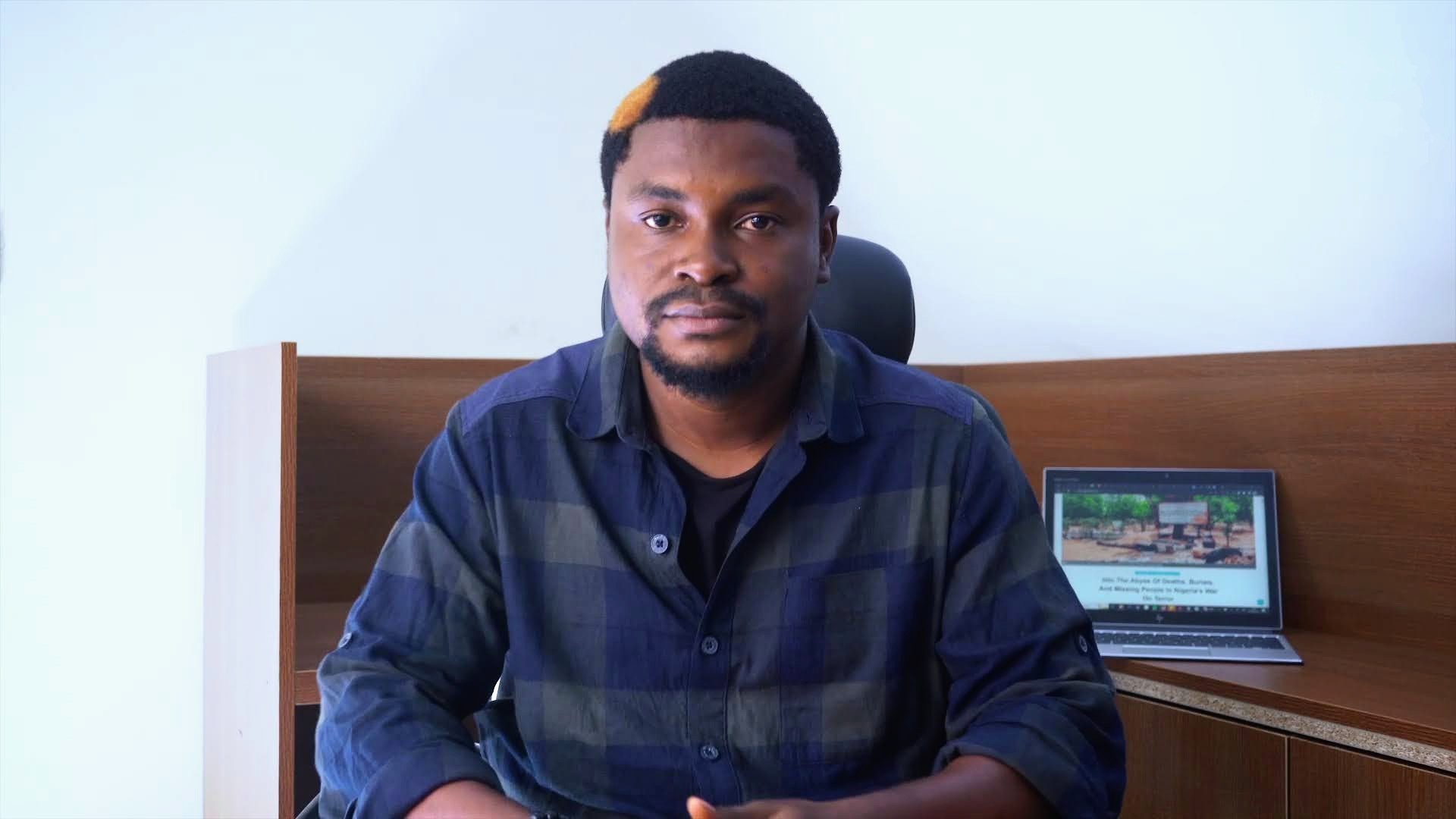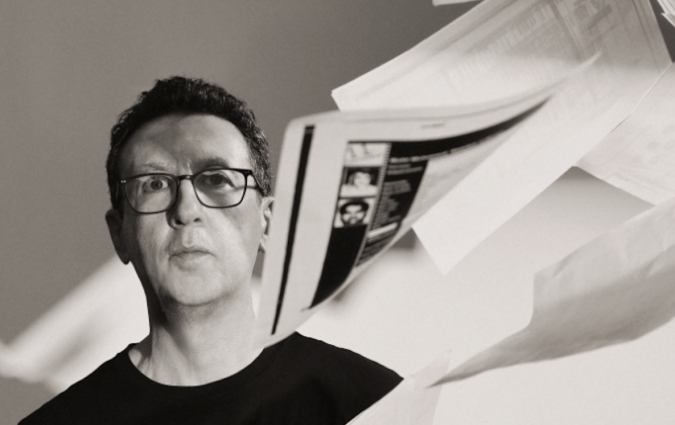The world moved on from Boko Haram. This reporter went back to tell their victims’ stories

Newly released 82 Chibok school girls reunited with their families in Abuja in May 2017. REUTERS/Afolabi Sotunde
Kunle Adebajo is a Nigerian investigative journalist and the Investigations Editor at HumAngle, a media platform with a focus on covering conflict and humanitarian issues in Nigeria and other countries in Africa.
Adebajo has covered conflict and issues around insurgency in northeast Nigeria. His reporting has focused on victims of Boko Haram and how they’ve been displaced from their homes and farms. In March 2023, he was announced as the winner of the 2023 Michael Elliot Award for Excellence in African Storytelling for a story which took a deep dive into the lives of some of the students who were abducted by the Boko Haram terror group in 2014.
I spoke to Adebajo about investigative journalism and the challenges of covering conflict in Nigeria. Our conversation has been edited for brevity and clarity.
Q. You have a background in law. Why did you become a journalist and how did you do the transition?
A. I have always been fascinated by the power of words to impact people. As a child, I thought the obvious career paths to build on this interest were law and journalism. And even when I opted to study Law, I still pursued my other interests through writing, public speaking and journalism.
As a freshman at the University of Ibadan, I immediately joined the student press organisation and served as editor-in-chief of two press outfits. By the time I was graduating, I had a decision to make: whether to continue down the path of becoming a lawyer or to embrace the life of a journalist.
The school took this burden out of my hands when it prevented me from graduating because of an article I wrote two years earlier. The piece was critical of a project the university management implemented that involved the tiling of hostel rooftops. It argued that this wasn’t serving a real purpose and the money could have been put to better use in renovating different parts of the hostels that were dilapidated.
Then I joined the International Centre for Investigative Reporting (ICIR) thanks to the recommendation of ‘Fisayo Soyombo and have been a journalist ever since.
Journalism has given me the opportunity to learn things I might never have come across any other way, to travel to places I would never have gone otherwise, to educate others, to create in so many different ways, and to carry the voices of the underserved across hundreds of miles to people who might offer them relief.

Q. You are one of few experienced conflict reporters in Nigeria who have covered humanitarian issues. Could you share your motivation for this kind of reporting?
A. All my life, I’ve tried to take the road less travelled. When I launch a project, it is because I’ve not seen any other person excelling at it. I do not wish to be a dedicated news reporter. Not because there is no value in it (in fact, it is insanely important) but because so many people are already doing that job.
I started as a generalist covering issues from politics to education, crime, health, human rights, the environment, and so on. One topic that did not enter my radar was conflict. And I was not alone. So many journalists were not looking in this direction either.
Naturally, I was fired up when I got an offer from Ahmad Salkida to join HumAngle, a platform that made it its mission to cover the issues of insecurity, conflict, and humanitarian crises. I saw it as a chance to tell the stories of grossly underreported yet critical issues. I also saw it as a chance to specialise and be known for something.
Q. What are the most challenging and the most impactful pieces you have done?
A. In terms of research, The curious case of the ‘unknown gunmen’ And IPOB’s Internet Propaganda is the toughest story I’ve worked on because of the sheer amount of data I had to collect manually and analyse.
The south-eastern region of Nigeria has recently gone from the most peaceful to the least safe area in the country, as a result of the violent activities of a group who refer to themselves cryptically as Unknown Gunmen (UGM). I looked for connections between the Indigenous People of Biafra (IPOB), a separatist group, and the UGM by poring through and doing a sentiment analysis of hundreds of social media posts where IPOB-affiliated accounts mentioned the UGM.
In terms of storytelling, Keeping up with the chibok girls: chasing dreams, battling discrimination, dropping out has been the most challenging piece I’ve worked on because of the weight of the story and the fact that I could never forgive myself if I did a terrible job of narrating it.
But all things considered, As the desert stretches, so does Nigeria’s farmer-herder crisis, is the most difficult report I’ve worked on so far. It required immense research, pushed me to the limits of my storytelling skills, and also demanded working with a fairly large team of people.
I am glad all these reports were published within the last two years and hope every year comes with its own challenges, storytelling projects that drive me to the edge of insanity and all but push me over.
Q. Which challenges have you faced when reporting these stories?
A. The first one is lack of data and transparency. We struggle to write some of our stories because we do not have credible data from government agencies to rely on for our analysis.
The security agencies would argue that they are withdrawing this information from the public because of national security, but this principle has been grossly abused. A lot of times, people have refused to talk to me because they are afraid of getting picked up and brutalised by the Nigerian military. There is also the issue of how years of human rights violations have entrenched a culture of silence.
Journalists face threats from all sides and this prevents them from doing their job. At HumAngle, we have received public threats in the past from Boko Haram. There is pressure from state agents, who accuse you of bias and not being patriotic. There is often pressure from the home front too, because you have to travel to places that aren’t safe. And then, sometimes, even your own colleagues in the media industry are not supportive of the work you do – but I think that has gradually gotten better in recent years.
Then there’s news fatigue. I suspect not many people want to constantly read about conflicts that are not taking place in their backyard and do not directly affect their well-being.
I do not know what the solutions are. But we need people in government to act with sincerity. We need civil society groups to mount more pressure on political leaders and demand accountability and justice when it comes to insecurity and humanitarian crises. We need people to understand that conflict reporting is crucial in making lives better for the victims of violence and bringing an end to war.
Conflict journalists like me need to be more creative and learn to tell these important stories in a way the public and key stakeholders care and take action about them. More funding and technical support would help.
Q. Can you offer five useful safety and personal tips you would share with journalists who want to become conflict reporters?
A. Do not underestimate the need for great local fixers who can help you to navigate through on-the-ground risks and negotiate your way out of trouble. Do not be a lone ranger; work with a team and constantly communicate with others when you are on the field. Ensure whatever you publish is objective, balanced, and accurate. Collaborate with other media organisations and civil society groups to make your stories more impactful and build a stronger wall of defence against possible backlash. Finally, do not take unnecessary risks.
Q.How do you think journalists could protect their mental health while doing this work?
A. Secondary trauma is real. Even though you may not be seeing actual gunfire and deaths, serving as a conduit for stories of anguish, loss, and suffering can be devastating.
It happens when you are interviewing people and listening again to the interview and writing the stories. Being a conflict journalist also means you have to watch videos of violence and the most inhumane forms of murder, so it is important to take your mental health seriously and also be in a work environment that does.
Journalists should have access to therapy whenever they need it without having to worry about costs. They should be encouraged and even forced to go on work leave. Newsrooms should listen and care.
Q. You recently won the Michael Elliot Award. What does this mean to you?
A.The prize means a lot to me. It means the world to be recognised not just as a journalist who has done well but as an excellent storyteller. That is what I aspire to be – someone who is able to use this skill to tell important stories about Africa. I also appreciated the fact that the award comes with a learning opportunity – spending two weeks at The Economist. Learning from journalists, editors, and other staff members there was an incredibly enlightening experience.
The winning story revisited the topic of the Chibok girls [kidnapped by Boko Haram] but from an angle that has been neglected for very long: how the girls benefitting from a federal government scholarship programme are faring right now and how successful the programme has been.
We need more stories like this. We need more stories the world has moved on from. We need more stories the government has been neglecting. We need stories from people who are afraid to speak or people no other person would talk to. But when those stories are told, we also need action and acknowledgement and apologies and clarification and impact. More than awards, journalists need to know all that work was not for nothing.
Q. What five lessons have you learnt from reporting on conflict and humanitarian issues?
A. War is a terrible thing. The reality of war itself is horrifying. But even after the gun barrels have gone cold, its effects ripple wide and run deep. It is important to document those effects. It is important to investigate the causes and write about them. People know conflict is bad, but they do not know just how bad. Even a conflict journalist can't grasp the full extent. And it is important for people to know so that we don’t end up making the same silly mistakes.
Secondly, it is important to train people to tell their own stories. One of the reasons I became a conflict reporter was that I saw that the bulk of in-depth stories about the Boko Haram conflict were getting published on international platforms headquartered in Europe and North America. It felt wrong. And even though we’ve come a long way since 2020, when HumAngle was established, there is still a huge gulf in capacity that we need to fill.
The third thing I learnt is that this job requires a certain level of level-headedness. If you want to do it right and do it for a long time, you need to get your facts right, be introspective and willing to self-correct when necessary, and be open-minded to a world of possibilities. You need to understand that the question of what party is right and what party is wrong usually comes down to the specifics. Context is crucial. Conflict and how it is handled is complex, and your narratives must reflect that.
The fourth thing I learnt is that collaboration is extremely important: between journalists and journalists, between journalists and the state, between journalists and humanitarian actors.
Finally, if you approach conflict reporting with the mindset that you want to change the world, you may have to reserve a bed in a psychiatric ward. As a journalist, you have to convince yourself that being able to document the evidence and the events as best as you can is itself a win, and there’s really little you can do to improve the lives of the many people you speak to.
But then again, as Apple famously said in its Think Different commercial, “The people who are crazy enough to think they can change the world are the ones who do.” One thing that has occupied my mind lately is how journalists can tilt the odds slightly in favour of the people they write about so that when they publish their stories, they do not see that as their final bus stop. What extra steps can we take to make sure we are not just piling up bylines but also impacts?
In every email we send you'll find original reporting, evidence-based insights, online seminars and readings curated from 100s of sources - all in 5 minutes.
- Twice a week
- More than 20,000 people receive it
- Unsubscribe any time





